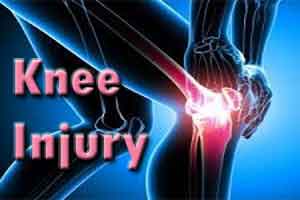- Home
- Editorial
- News
- Practice Guidelines
- Anesthesiology Guidelines
- Cancer Guidelines
- Cardiac Sciences Guidelines
- Critical Care Guidelines
- Dentistry Guidelines
- Dermatology Guidelines
- Diabetes and Endo Guidelines
- Diagnostics Guidelines
- ENT Guidelines
- Featured Practice Guidelines
- Gastroenterology Guidelines
- Geriatrics Guidelines
- Medicine Guidelines
- Nephrology Guidelines
- Neurosciences Guidelines
- Obs and Gynae Guidelines
- Ophthalmology Guidelines
- Orthopaedics Guidelines
- Paediatrics Guidelines
- Psychiatry Guidelines
- Pulmonology Guidelines
- Radiology Guidelines
- Surgery Guidelines
- Urology Guidelines
Estrogen puts women at greater knee injury risk than men

Washington D.C : Women are more likely than men to sustain a knee injury. But why? According to a new study, it is all about estrogen level.
Researchers from The University of Texas Medical Branch at Galveston have found that women, who take the birth control pills that lessen and stabilize estrogen levels, were less likely to suffer serious knee injuries.
Female athletes are 1.5 to 2 times more likely than their male counterparts to injure their anterior cruciate ligament, or ACL. The ACL is a ligament that connects the top and bottom portions of the knee.
Using a national insurance claims and prescription database of 23,428 young women between 15 and 19, the study found that women with an ACL knee injury who were taking the birth control pill were less likely to need corrective surgery than women of the same age with ACL injuries who do not use the birth control pill.
Researchers have proposed that the female hormone estrogen makes women more vulnerable to ACL injury by weakening this ligament
"Birth control pills help maintain lower and more consistent levels of estrogen, which may prevent periodic ACL weakness," said lead author Aaron Gray. "With this in mind, we examined whether oral contraceptive use protected against ACL injuries that require surgery in women."
"Young athletes currently use birth control pills for various reasons including more predictable cycles and lighter periods," Gray said. "Injury risk reduction could potentially be added to that list with further, prospective investigations."
The study appears in Medicine & Science in Sports & Exercise.
Researchers from The University of Texas Medical Branch at Galveston have found that women, who take the birth control pills that lessen and stabilize estrogen levels, were less likely to suffer serious knee injuries.
Female athletes are 1.5 to 2 times more likely than their male counterparts to injure their anterior cruciate ligament, or ACL. The ACL is a ligament that connects the top and bottom portions of the knee.
Using a national insurance claims and prescription database of 23,428 young women between 15 and 19, the study found that women with an ACL knee injury who were taking the birth control pill were less likely to need corrective surgery than women of the same age with ACL injuries who do not use the birth control pill.
Researchers have proposed that the female hormone estrogen makes women more vulnerable to ACL injury by weakening this ligament
"Birth control pills help maintain lower and more consistent levels of estrogen, which may prevent periodic ACL weakness," said lead author Aaron Gray. "With this in mind, we examined whether oral contraceptive use protected against ACL injuries that require surgery in women."
"Young athletes currently use birth control pills for various reasons including more predictable cycles and lighter periods," Gray said. "Injury risk reduction could potentially be added to that list with further, prospective investigations."
The study appears in Medicine & Science in Sports & Exercise.
knee injuryMedicine & Science in Sports & ExerciseThe University of Texas Medical Branch at Galveston
Source : ANINext Story
NO DATA FOUND

Disclaimer: This site is primarily intended for healthcare professionals. Any content/information on this website does not replace the advice of medical and/or health professionals and should not be construed as medical/diagnostic advice/endorsement or prescription. Use of this site is subject to our terms of use, privacy policy, advertisement policy. © 2020 Minerva Medical Treatment Pvt Ltd